#ask historians
Explore tagged Tumblr posts
Text
All right, time to talk about the Maines. I apologise that this is so delayed -- I've had terrible pain-related brain fog lately, but today I can at least think, even if I'm typing this from bed because sitting up at a desk is Bad.
A couple of weeks back, a friend sent me this AskHistorians question:

This is very much my area of expertise, but I don't use Reddit, so I said I'd answer it here, for the benefit of @llwhn (and anyone else who is interested).
First of all, context: I published an article about the seven Maines in Cambrian Medieval Celtic Studies 83 last year, which is one of the only pieces of research published on the topic in recent years. Unfortunately, I can't share this article online due to the copyright restrictions of the journal, but it's my research there that I'm drawing on. The Maines are a complicated bunch -- although we're told there are seven of them, they actually number between six and eight in any given list, and their names vary noticeably.
To show how much they vary, let me show you the table I produced for my CMCS article:

As we can see here, there’s considerable variation in a) how many of them there are, b) what their names are, and c) what order the names are in. This last point might not seem important, but it’s going to come up later.
Now that we’ve had a chance to appreciate that the ‘seven’ Maines are a far more complicated bunch than they appear, let’s get down to the specifics of your question. You wanted to know whether Maine Cotagaib-Uile’s epithet is implying that he’s nonbinary (or perhaps intersex?), especially as it talks about inheriting traits from both parents. This is a really interesting question, and not one I’d thought about before – surprising, since I also work on queer readings of medieval Irish texts. Having thought about it for a while, I don’t think that’s what’s being suggested here, but let’s look at it in more depth.
‘Cotagaib-Uile’ is probably the epithet to have received the most attention of those in this list, although given how little has been published about the seven Maines, that isn’t saying too much. This is interesting, because as you can see, it’s not in all of the lists, and some of the omissions are significant.
Quick Maine backstory: in some traditions, we’re told that the Maines originally had different names, and were renamed because of a prophecy Medb was given that her son Maine would kill Conchobar. She had no sons called Maine, so she renamed all of them (and one of them ends up killing a Conchobar, but not the one she wanted dead). This story is found in Cath Boinde / Ferchuitred Medba, as well as in a couple of manuscript fragments by itself; the first four columns of the table above show the lists of names given there.
In fact, let’s have another table, this time showing the ‘original’ names of the Maines and the epithets they were given when renamed, according to these four manuscripts:
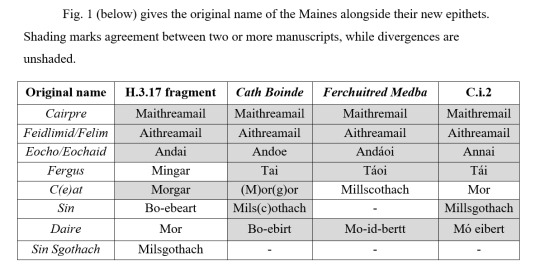
Yep. As we can see, these manuscripts can’t agree on anything, which is funny, since they’re all versions of the same text. It just goes to show what a complicated question the Maines’ epithets offer. The fact that Cotagaib-Uile isn’t in this list is interesting, though, because some scholars have attributed quite a lot of importance to this name.
Introducing: Sir John Rhys. John Rhys was the Jesus Professor of Celtic at Oxford in the 19th century, and yet despite this distinguished academic background, managed to write a lot of absolute nonsense. That’s the 19th century for you! Rhys has the dubious honour of at least being creative in his wildly unsupported arguments; I love the confidence with which he’ll assert “this undoubtedly means X” when there is definitely a great deal of doubt and in fact it almost definitely doesn’t mean X.
Rhys is, however, one of the only people apart from me to have spent much time looking at the names of the Maines, so I was forced to consider his arguments for a while when I was writing this article. As we’ve seen above, there are often more than seven Maines, and Rhys, who had a theory that the “secht Maine” represented the days of the week (“sechtmain”), was keen to understand why there might be eight of them. He said that the epithet ‘Condagaib-Uile’ should be read as suggesting that this Maine ‘contained or comprehended all the others’. In this way, he’s functioning as a ‘superlative eighth’ to the seven – all the others are contained within him, just as sometimes triads give three examples of something and then a fourth that’s better than all of them.
But that’s not what the explanation given in Táin Bó Cúailnge suggests it means, is it? Now, I’ll note that Faraday’s translation is pretty old, and I wouldn’t generally use it. However, I pulled out Cecile O’Rahilly’s translation of the same line, and it’s pretty similar:
‘Their names are Maine Máthramail, Maine Aithremail, Maine Mórgor, Maine Mingor, Maine Mo Epirt, who is also called Maine Milscothach, Maine Andóe and Maine Cotageib Uile—he it is who has inherited the appearance of his mother and his father and the dignity of them both’
Cóir Anmann, a treatise on names, gives an explanation that seems to encompass Rhys's interpretation while saying the same thing as TBC:
‘who includes them all’, ‘i.e. had the appearance of his mother and father. For he was like them both’ (trans. Sharon Arbuthnot)
It's clear that even when Cotagaib-Uile is referring to "them all", it's not quite in the manner that Rhys argued, so his interpretation isn't particularly convincing. (He also attributed a lot of important to Cotagaib-Uile being the last in the list, which we can see very clearly from the table above is not always or even mostly the case.)
Instead, it definitely seems to be the “appearance” of both mother and father that the text claims Maine has inherited. Let’s look closer at that, because we don’t want to be misled by translations. Faraday uses ‘form’ instead; the difference there is negligible, but it might be significant, if we’re trying to read into this regarding gender and bodies.
The Irish word in TBC is ‘cruth’ meaning form, shape, appearance; beauty of form, shapeliness. It does refer to physical appearance, but it doesn’t seem to be a particularly gendered term referring to physical traits. There is no evidence, for example, that this is implying an intersex body containing both male and female traits. The simplest way to read this is just “he looks like both his parents”, which is a normal thing to say about somebody.
Moreover, it’s worth considering this name in the context of two of the other Maines in the list:
Aithremail, ‘like his father’, ‘i.e. he was like his father, i.e. like Ailill son of Máta’ Máithremail, ‘like his mother’, ‘i.e. he was like his mother, i.e. like Medb daughter of Eochaid’ (again from Cóir Anmann, translated by Sharon Arbuthnot)
If one brother takes after their father, one takes after their mother, then suggesting that a third brother might take after both of them doesn’t seem like a particularly loaded statement.
Indeed, if it was a loaded statement, we would expect these Significantly Gendered Traits to show up somewhere else. After all, Maine Mingar and Maine Mórgar get a whole story in which the “duty” (gar) of their names is positioned as central – that’s Táin Bó Regamain. So we might think there was a story in which taking after Medb or Ailill was significant, but there’s certainly no surviving story in which that happens.
That doesn’t mean there never was a story in which that aspect of their epithets was emphasised, but although Maine Mathremail and Maine Athremail are present in every list (a rarity among the Maines), I’m not aware that they ever get to take a starring role in any text that survives today. Likewise, there isn't a story in which Cotagaib-Uile’s superlative or combinatory nature is foregrounded.
All of that is a very long winded way of saying that I don’t think they are implying anything about this Maine’s gender: I think they’re simply saying that he has inherited traits from both Medb and Ailill. Since Medb is notorious for behaving in an “unwomanly” manner by trying to lead armies into war and so on (something some medieval authors were not impressed by), this also probably isn’t suggesting any of those traits were especially feminine.
But. That doesn’t mean this epithet, and the textual explanation given for it, doesn’t create space for a nonbinary reading of Maine. I’m all in favour of exploring queer possibilities regardless of the authors’ intentions. I think it would be challenging to argue for a trans reading overall simply because Maine Cotagaib-Uile does nothing else in the text except be included in this list, and therefore has no personality or behaviours to draw on, but that doesn’t mean you couldn’t choose, in your own creative or exploratory works, to explore nonbinary possibilities.
Moreover, although I don’t think this Maine is being portrayed as ambiguously gendered on purpose, Táin Bó Cúailnge is not a text where gender binaries are neatly demarcated and always maintained. Crucially, Cú Chulainn himself is a deeply ambiguous figure whose masculinity is constantly questioned, undermined, and problematised by those around him, and his own behaviour challenges their assumptions and their definitions of 'man'.
As people who follow me here know, I have an article which will be available in the next month or two about the ambiguities of Cú Chulainn’s gender and what this says about TBC as a text. I tend towards a transmasculine reading, and suggest one in this article, but that’s certainly not the only possibility. The value of queer and gender theory is that once you start dismantling assumptions about gender in this story, you can have a lot of fun looking at how it’s actually being constructed, rather than just how we assume it’s being constructed.
So I definitely think there’s potential for exploring more facets of gender in TBC than the ones that have already been discussed (by me or by others). And perhaps looking at epithets like this and what they tell us about personalities, appearances, and gender would be a good place to start – because clearly, medieval authors didn’t think it remarkable that a son could inherit the appearance or nature of his mother, or neither Maine Mathremail nor Maine Cotagaib-Uile would have the epithets that they do.
tl;dr: This passage in Táin Bó Cúailnge is probably not implying that the character in question is nonbinary, but there is lots of space for queer readings of this text.
For further reading on the seven Maines and the meaning of their epithets, you might enjoy my CMCS article; there’s a link on my website, which is also where I will also upload the article about Cú Chulainn and gender as soon as it’s available.
I hope this has been useful/informative, and I’m sorry it took me so long to get to it!
#6-8 assorted maines#tain bo cuailnge#the tain#the seven maines#medieval irish#ulster cycle#ask historians
58 notes
·
View notes
Text
create progeny (have purpose) create something that is "yours" through unity or love or eros or something, experience tension & release & the expansion/devouring/penetration of your identity, let them also create progeny, the planet is overpopulating and who needs more of us, well that is a question for another time, a later generation, when time comes that overpopulation threatens our need for food, water, shelter, normal temperatures, we'll change purposes.
or. or we could become climate change scientists and work on. prolonging the cycle of. prolonging the life of the energy that we depend on. (don't know how we did it before and survived 3000 years like the egyptians did. agriculture? bronze and iron tools? maths? how big was their empire, population-wise? i guess the need for energy is not so great when you don't have the internet or ai or large scale mining or computers or cars. just slaves.
this sort of answers my question about how did the philosophers in ancient greece... live. like if they didn't produce food, or labour, or "production" in the industrial sense. i imagine it's something like, there are warring tribes (as there were in china too) and you need philosophers, because in the neverending cycle of chaos and order, how do you find what is good? what should the goals of a ruler be, anyway? what should a person aim to do? what is the best way to govern? how can people be happy? should people be happy? how do you find your ideals? and so philosophy was something people needed, something that it was absolutely worth giving the surplus production to.
#ask historians#just like. argue with me? sincerely? (that's what i call discussion i guess.)#please i need to be humbled#obviously there are complexities to this but#i feel like i've only just reached the stage where#it's like oh. i'm finally maybe comfortable with... the childrearing/overpopulation issue. i like children.#like how do you justify bringing another person into the world who will sap resources if you are dooming them to a life of suffering#and pointless labour. accounting *is* important but that's not why *i'm* considering being an accountant. you know? to me#it's attractive because it's straightforward. there's not a whole lot of creativity required in the technical work. and you get paid enough#to go on vacations and have nice things. but i also know deep down i would not be satisfied with that. i would not be satisfied#only pursuing the craft/the art of living of childrearing of marriage of relationship management of financial management of office work.#i have too much chaos in myself i think? idk.#the craft/art of conversation too. that's lowkey important for accountants (who need to communicate to their clients). what i mean is --#i want to explore other ways of communication of self expression. maybe. like maybe i'd do fine as an accountant. but they're all just..#arbitrary choices! like the multiverse. no evelyn's life is the life *destined for her* that would have been the *best* for her.#but you have to choose.... i have to choose without really having a justification. there are no right paths. no wrong paths.
0 notes
Note
Meemaw Bucchi and Grandma Mal should go on a nice little date. Old womanYuri. /j
If I had a nickel for every time someone mentioned "old woman yuri" in a post of grandma bucchi and grandma draconia, I'd have two nickels. Which isn't a lot, but it's weird that it happened twice. 👀
nsdajkdjksaj Just kidding, is just funny to see people enjoying seeing them interacting, here, have a little treat... they're ✨ holding hands✨

#twst#twisted wonderland#ask#lady maleficia#grandma bucchi#grandma draconia#historians will say they were close friends#sdhabdsabdadas just joking just joking#unless#twst fanart#twisted wonderland fanart#vovó bucchi
788 notes
·
View notes
Text
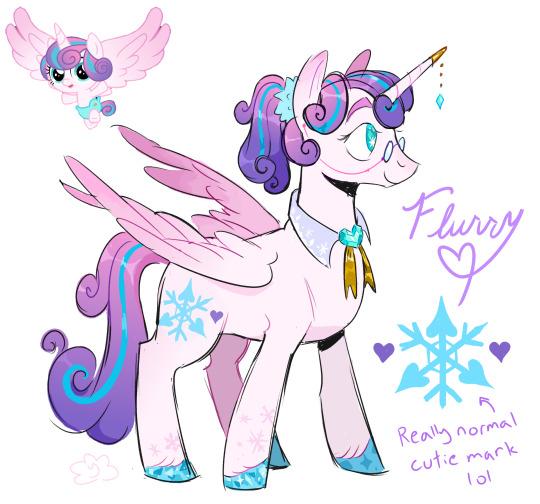
I know its not canon but I always liked the idea that Flurry Heart grew up to be a normal pony. Never went on any princess-title-earning quest, no grand magical destiny, no real royal responsibilities. Just a normal pony (who happens to be an alicorn) free to enjoy life with her friends and hobbies
#mlp#mlpfim#my little pony#flurry heart#my little pony friendship is magic#I picture her as maybe being a historian or academic inspired by her aunt twilight#or maybe a designer or event planner or even an engineer#just like some really normal job lol#since the title of princess is supposed to be earned and not inherited in equestria not that flurry heart isnt worthy of being a princess#but i feel like it makes more sense that shes just a normal pony#maybe she helps raise the sun and moon when twilight needs a day off once in awhile though#who inherits guardianship of the crystal empire then you ask?#idk. alicorn sunburst. lol!#wait maybe shed have some kind of weather related job since she has a snowflake cutie mark
1K notes
·
View notes
Text
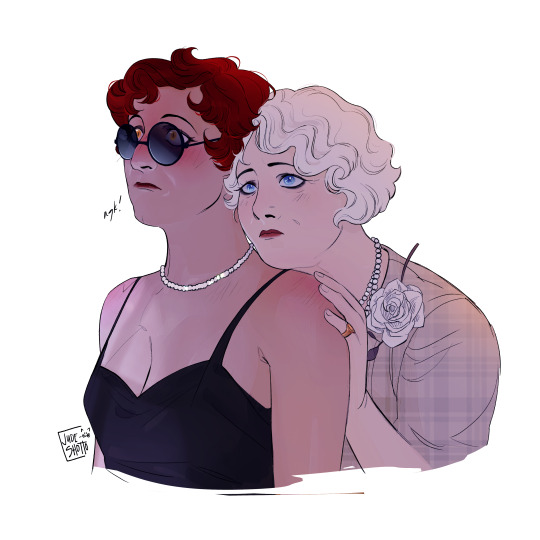
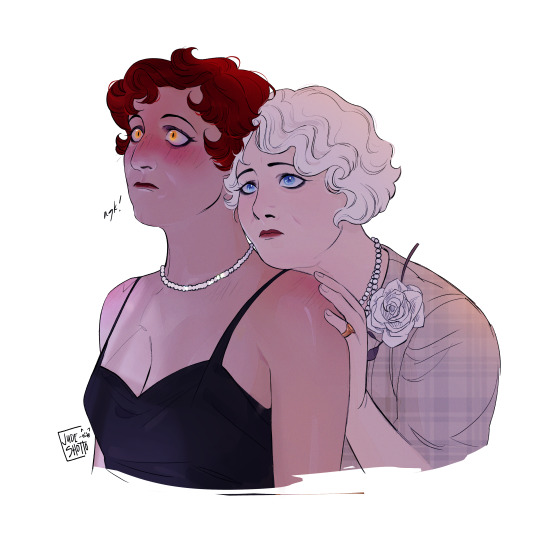
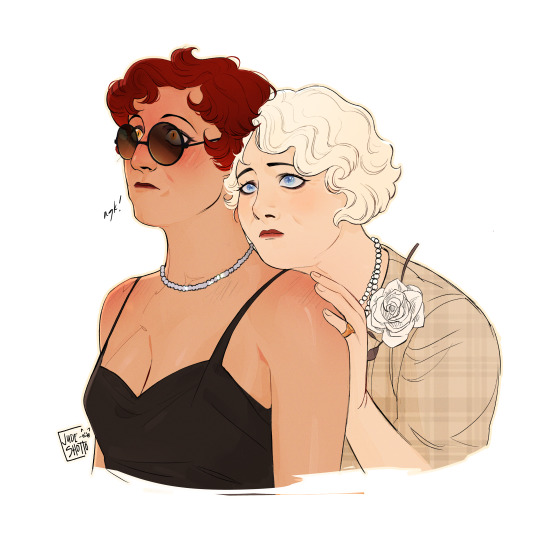

🌟1920s Ineffable Wives🌟
which version do you like better?
process video🍉
#I wonder how many historians these two met and got described as “close friends”#(yes I say that like the roommates vine)#don't ask me about the accuracy on century looks#that's not my major and I'm just a gay orz#ineffable wives#good omens#aziraphale#aziracrow#crowley#judeshottoart#fem aziraphale#fem crowley#fem aziracrow#ineffable husbands
897 notes
·
View notes
Text
I have a firm belief that the only way Yellowjackets can end is with the death of each of the remaining survivors and [redacted] was just the first (second, really) of what will be all of them in time. "The wilderness" will reclaim them one by one because they weren't supposed to leave. But also they will be swallowed up by their own darkness in their refusal to acknowledge it and that will be the great tragedy of it. All of their deaths will be preventable, but inevitable in light of the cycles they keep on repeating.
#erin is talking#yellowjackets#whichever one has the role of the storyteller is going to be the last#I think this could be Shauna (the writer) or Misty (the lens through which the others are framed - see: elevating Nat to the queen)#the historian is going to live to bear witness to each end#Lottie however is going to have to close the loop and die#think about it: Lottie has had so many instances of basically asking to be allowed to die and the others denying her that#Laura Lee kicked her out of the afterlife; Van did not allow her to be on the table for their first hunt#The thing about your Jesus figure is that eventually (s)he does have to die#Whether she wanted that role or not she has to close the loop that began with her
2K notes
·
View notes
Text
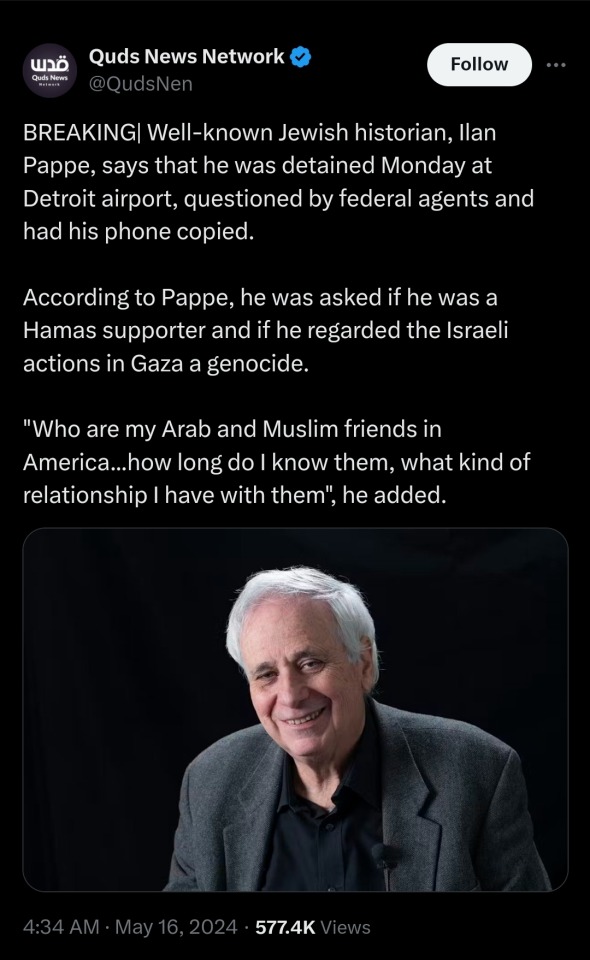
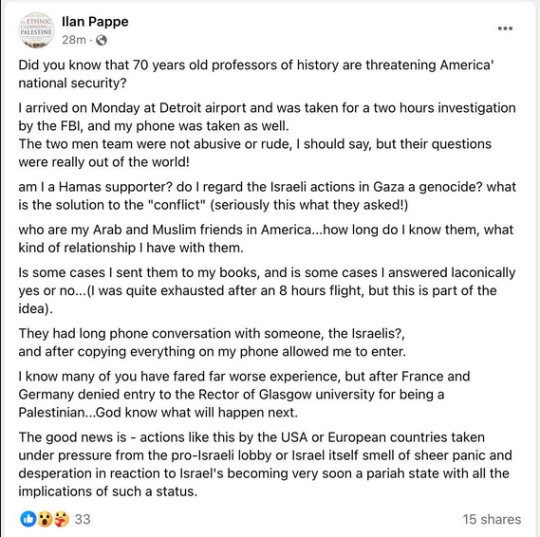
Ilan Pappe is a preeminent author, historian and speaker who has written about the Nakba, the series of calculated horrors and atrocities on the basis of which the apartheid regime called israel was founded.
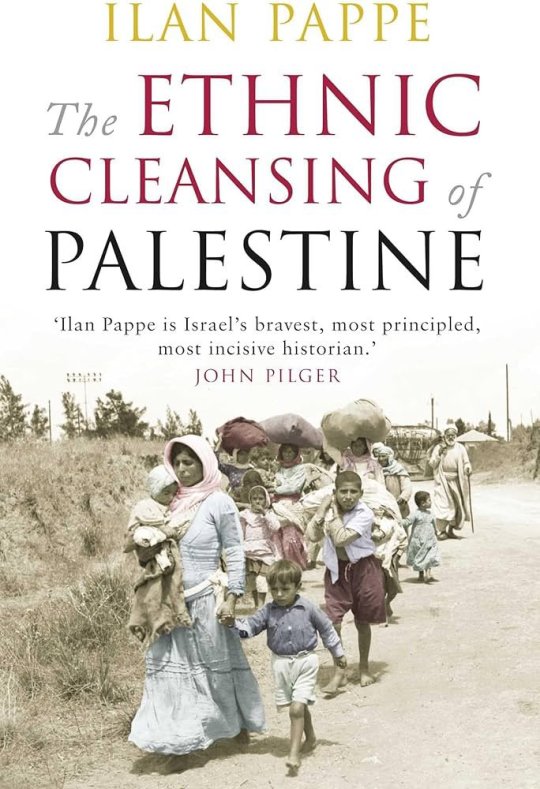
genocidal maniacs are persecuting anti-genocide intellectuals.
detaining and interrogating Jewish scholars is definitely not antisemitism...
madness!
#at this rate is there any fascism left for trump to do#palestine#free palestine#in america if you are anti zionist historian#the feds in airport ask if you have brown friends and copy your phone data for intel gathering#gaza#gaza genocide#gaza strip#gaza under attack#rafah#all eyes on rafah#west bank#usa#yemen#egypt#settler colonialism#anti imperialism#ilan pappe#tel aviv#current events#current news#eurovision#student protests
184 notes
·
View notes
Text
shoutout to absolute maniac mary phillips née houston for
dating gay little eugene sledge in high school ("we did everything together [...] he dated my wife" @00:05:26)
then marrying his best friend--who wooed her in eugene's car!!! (from sid's book, h/t meg @ww2yaoi; X)
putting up with eugene wearing white to the wedding like an absolute diva (fig. 1)
letting eugene hang at their house every night until 2am ("alright, miss mary, i'll leave" @00:05:49)
clearly remaining very good friends with eugene in her own right (fig. 2)
the more i learn about how much of a package deal the three of them were, especially in the years immediately after the war, the more i have to respect mary for being soo hilarious for this (and patient for putting up with pathetic gay sledge <3)
fig. 1: from sid's book, h/t jen @crowthis

fig. 2: h/t @leckiestrikes; X

#thank you meg and jen. tireless historians#also not the point of this post but eugene was SO out of pocket for asking mary out in the first place#because sid said he had a major crush on her lmaooo#and would moon after her in the lunch line#that's the number one rule eugene!!#the pacific#eugene sledge#sid phillips
52 notes
·
View notes
Text

Thinking about punk herstory again...
#vivenne westwood#johnny rotten#the damned#new york dolls#malcolm mclaren#adam ant#this is a niche meme for my fellow punk historians#I've just been obsessed with punk history recently because ive been reading a book about goth history#and ive seen a few original punks#and just been consuming a lot of old punk and goth#Malcolm McLaren fascinates me because hes such a prick i cant believe hes fucked over so many bands#hes like grunkle stan if he was a punk manager#for context#johnny rotten hates him because he mismanaged them and wouldnt pay them and started piL in retaliation#adam ant asked him to make him a really big pop star and after a few months kicked adam out of his own band 😭#got the new York dolls to preform in a comminist get up which casused so much controversy they disbanded#and got everyone to turn against the damned and poser shamed them because he was pissed that they made a record before sex pistols#im sure u all know about how he and vivenne Westwood ran their punk clothing line Sex and managed and dressed all their bands#then they went rockabilly (every punk has a rockabilly era)#then it was sex#and after punk they liked pirates and rebranded to Worlds end and basically made new romantic fashion
129 notes
·
View notes
Note
You drew Kuuya with a cat mouth for the first time on September 14th.
wait youre right..............it was the aftermath of The Yeast post.....without it we would never have the catboyification of kuuya... everybody say thank you vaginal yeast anon
#ask#anon#the butterfly effect of it all. truly#also anon is the kuuya historian up in here damn#kuuya posting
179 notes
·
View notes
Note
we need to study the grip newsea and peggy hairs still have on the community even with all of the new, shinier alpha hairs available
🙂↕️ so true bestie 🙂↕️🙂↕️🙂↕️

Example: Peggy's 4434/J102/Mh081121 was made in 2008
Just look at it - mesh that is over sixteen years old, with almost 20 known recolors and retextures, alpha edits, and it's even been converted for female.
The absolute GRIP of it all.
(and while we are here - much <3 to @krabbysims and the ts2 hair database)
45 notes
·
View notes
Note
Ron's constant meddling in Harry's love life really IS constant... case in point: his genuine concern that Harry might be a bad kisser (??? What are you going to do, offer to practice?)
well!
48 notes
·
View notes
Note
follow up question regarding fashion inspo-- do you happen to have a pinterest board or know of other places to look for non tudor fashion that you could link? my own search has been pretty fruitless. also rly love how you draw and render fabric!! ty for ur insight and thoughts :]
thank you! this is a pretty broad question so I'm not sure that I can give the most helpful answer but I find this timeline by the FIT to be a nice, quick visual guide for period trends. Unfortunately it primarily focuses on the regions of current day England, France, and Italy, so no Rus fashions to be found there, but you can poke around pre (and post, if you like) Tudor period/outside of england to see what late medieval and early modern people were wearing as depicted in art of the time.
Rus fashions are harder to dig up and I don't have great advice there... Resources in english kind of suck but you kind of just have to scour... I try not to get too hung up on accuracy for asoiaf stuff, since at the end of the day I'm combining a bunch of different styles that I like into a fantasy setting, so I'll take pieces from bilibin illustrations, or period shows, or whatever other crumbs I can find.
unfortunately I don't have the most organized process but hopefully that is somewhat helpful!
#asks#i have a pinterest board but it's a nightmare to look through so it is private#im not a fashion historian so i'm not really that qualified to give any advice but i try to be helpful anyways...
25 notes
·
View notes
Text
"Administratively, too, [...] queens were considered the legal lords of their landholdings. [...] Grants noted that the queen's officials had administrative autonomy without being subject to the king or anyone else, and evidence of the same assumption can be gleaned from court rolls that were recorded with headings indicating the lord of the manor whose court proceedings were being enrolled. As an example, some court rolls for the manor of Haveringatte-Bower specified that it was the court of [Margaret of Anjou] that was in session, while later rolls recorded Elizabeth Woodville as the lord of the manor court."
— Michele Seah, "My Lady Queen, the Lord of the Manor': The Economic Roles of Late Medieval Queens", Parergon, Volume 37, Number 2, 2020.
#queenship tag#margaret of anjou#elizabeth woodville#I really appreciated how Seah acknowledged the uneven surviving evidence for her subjects and how that affects her analysis.#It was very brief but it was more than what most historians do so it was very refreshing :)#my post#english history#this is for @ anon who asked if its true that Margaret mostly hosted her own courts while EW mostly stayed with her husband#I'm not sure which (if any) historian has said something like this* but I highly doubt it's true !#We don't really have solid itineraries in place for either queen to make any kind of firm conclusions of the sort#(ie: about their residences or anything else) though I'm sure it would have varied depending on the situation#But either way it's explicitly clear that both Margaret and Elizabeth held their own courts in their own lands on multiple occasions#And we also have evidence of both of them residing with their husbands in regular circumstances#*tbh this is too long to get into right now but this assumption does fit into the few 'revisionist' interpretations of both Margaret and EW#(which imo is just as degrading as her traditional interpretation for the latter) so I wouldn't be surprised if some#historians may have framed their situations in such a way and relied entirely on their own assumptions to do so#Either way as far as I know there is no evidence of any such contrast existing - at least not on a consistent basis.#and the evidence we do have contradicts the assumption#Hope this helps! I figured a proper excerpt from this article would clarify the point better than any direct answer from me <3#queue
55 notes
·
View notes
Text
okay so,, I don't know if i have it in me to write a whole fic, but i needed to get this slightly dark Paul out of my head
Paul is married off to Feyd the second Feyd is of age (which avoids the attack on Arrakis yadayada as Feyd, alongside Paul, will inherent Arrakis, everybody wins). At first, obviously, the boys don't like each other very much, they're two teenagers, but they're also of noble birth, it's their duty, and Paul is bene gesserit, his whims have no place here. Feyd tends to ignore his husband most of the time, but he sleeps in the same bed, sometimes he'll stay in their rooms while Paul read or draws, somethings he really just stays there, quiet, sometimes he will engage in an activity of his own, they're practically parallel playing, sometimes he'll excise, and Paul will quietly join him. Paul knows he could seduce him, but there's just something about Feyd, how he avoids physical contact, how he'll move an inch away when approached, he's very mistrustful, and Paul respects that. It only infuriated him a "bit" when he found out Lady Fenring seduced his husband, and he knew why. Still, Feyd willingly spends time around him, and he doesn't do that to anyone else, and that means something.
Living in Geidi Prime proves to be a chore, it's harsh and cold and empty. Paul has observing as his form of distraction, right away he understands the power balance here, he understands why things happen the way they do, he sees the Baron for what he is, he also starts to understands Feyd the longer he stays with him. Paul never had anyone his age around, granted, but he also never had anyone match his wits, and he's delighted with how smart Feyd is. From what he learned with the bene gesserit, his husband was a animal, aggressive and not particularly intelligent, like his brother but stronger, he thought his marriage would be just taming a beast, like he was trained to do, dull and uncomfortable. But oh, what a delicious surprise!! Feyd managed to deceive the witches, made this mask of a monster, but of course, no one can get close enough to see through it. Paul does, like a bad dog, Feyd-Rautha bites when threatened. And soon Paul realizes, that everything here is a threat to Feyd, and has been since he can remember, the biggest threat? the Baron. He feels sorry for his husband, but he knows that would not please Feyd, and Feyd made the effort to be around him, because for some reason, he decided to stay with him for life and not just, kill him, and he's happy with that, so he does his best to show Feyd what a family is, because now they're family.
Paul sets for old fashioned childlike friend making instead of bene gesserit seduction. He talks to Feyd, even though Feyd does not respond, tell him things, sometimes random things, sometimes important things about himself, just to make conversation, to guide Feyd. The Na-Baron is very confused at first, but he listens, Paul urges him to speak too, he doesn't really knows what to say, but in time, he starts making comments about things here and there, like he's seen Paul do, which seems to please Paul. They create a routine. He annoys Feyd enough that the older has no option but let him do whatever he wants, and what he wants? to know Feyd, to be his friend. Feyd is not really familiar with the concept, he has his pets of course, but they're just one of the twisted mentat's failed experiments. The girls are beautiful but with the intelligence of a doberman. They were given to him as mock, but his pets suppressed expectations in his hands. Paul doesn't mind them at first, they scare him but it's nothing he can't deal with. He knows Feyd loves them, he usually doesn't show soft emotions, not here, never here, but Paul just knows, he can feel it. So he approaches the girls, he has heard all kinds of horrible things about the Na-Baron's harem of cannibals, but that's just what they are. They were born cannibals, they need human meat, Feyd is a gladiator, he keeps the girls fed, nothing else. For the world it looks sadistic and evil, adding to Feyd-Rautha's lore, from up close, it's really what Feyd can show of compassion. Gretel, Mischa and Niobe, they can't talk, but they're smart, Paul teaches them some sign language. Feyd is more than impressed, the girls usually don't let themselves be approached by strangers, but Paul won them over, especially Niobe, she's the one more taken by his little husband, follows him around and is eager to communicate, even started to sleep by his bed. Feyd asks to learn sign language too, of course, he also wants to communicate better with the girls. Paul can explode with happiness, something else to bond over!!! They're already have fighting, flying and Paul noticed the dedication Feyd has with his looks and decides to match him. It takes hard work, but Feyd starts to relax around Paul. He also understands Paul is his equal, just as intelligent, just as resilient, he can see Paul and Paul can see him. He's still hesitant, like a wild animal who was kept in a cage too long, but he's getting there and that's okay for Paul, he'll teach his husband, feelings are hard and Feyd never learned to deal with them besides bottling them up and attacking first, but now Paul is here, they are friends.
Enough spice in the food has enhanced his perception, he noted, and easily enough, he knows who he is, what he is, not just a Harkonnen by marriage but by blood. He can feel it now, in the back of his conscience, that thing that have always flown through his blood but he could never name it, hedonism. His sheltered, kinda repressed, life in Caladan makes him a little angry, all he has been denied and for what?. The Baron obviously takes a like for him, and he understands why, he also understands why Feyd seems uncomfortable, almost disgusted with it, and he too, feels a little thrown off by it, but he's bene gesserit, he uses it.
No reason to tiptoe aroud it, Paul calls him grandpa, which just makes the Baron happier with him. He stays at the Baron's side, sits with him in his floating device, talks about whatever the Baron wants, let's his thick hands linger, he gains advantages over the fat man. Soon enough, he's included in the important conversations. Even though the old man is a disgusting creature, Paul sees he's also very intelligent, and even learns a thing or two from the Baron. His grandfather is more than happy to dress him up in the most expensive fabrics, parade him around like a trophy, and Paul does the Baron's biding because yes, he's the most disgusting man in the galaxy but boy, he sure knows what he's doing, and he's got to make the most out of his situation. He knows his family would be outraged to see the Duke's son like this, in the Baron's lap, laughing, clinging to him, whispering in his ear a thing or two he noticed about the nobles around them. But Paul is not just the Duke's son, he's bene gesserit, he has the power here, he's a mentat, he's doing this for the advantages, he's Harkonnen, he's doing this because he can, because it's his birthright.
Paul noticed how Feyd would tense up in the Baron's presence, how he hated to be touched by anyone but held very still anytime it was necessary, he noticed Feyd would cover his body head to toe when he had the choice, only socially he would be showing skin, enchanting everyone around him like a good showman, and Paul knew he hated it, he knew he was doing what he was taught to do, to be a good boy and entertain. Maybe after a while he ever got a taste for that, not enough to enjoy having skin showing around the Baron, but enough to do it effortlessly.
After so much time around the Baron, Paul learned he did, in fact, have strong Harkonnen blood running through his veins. He enjoys power, he enjoys lavishness, he is very much a hedonist. The bene gesserit training served him well, but he saw through them now, he would not do their bidding, especially after learning what they did to Feyd, setting a trigger word that would render him paralyzed, "for safety" they said, it makes his blood boil. Taking away Feyd's agency, making him vulnerable, he knows those are Feyd's biggest fears, oh how he would snap those witches necks with his bare hands, maybe he will if they ever get too close to his husband. Let them think he tamed the beast, let them think of him as a beast, that keeps him safe, and Paul learned from Feyd, add fuel to the fire if it's working for you.
His training from his old masters also served him well, but now that his grandfather included him in real talks about the imperium he knows there's no such thing as morally better or whatnot, if anything, his father was not very smart, leading with his heart and training with repression. He loves his family dearly, but the world is so much bigger now, and out of everyone, is the Baron teaching him. His sees now, his mother is a Harkonnen like any other, hungry for power, he cannot see how love would blind such a powerful woman, that's why she defied the sisterhood, why she tried to make him a boy, the one. He wonders how different things would be if she had been raised by her father, maybe she would be like himself now.
Like the Baron, he thought of Feyd as "his", differently from the Baron, he would NEVER hurt him, and that's how he distance himself from that man, he can not stand the thought of Feyd being hurt, and he will do whatever it takes to protect his husband, his friend. He knows Feyd initially was angry at him for this behavior, withdrawing from him, he couldn't understand why Paul would let the Baron touch him, knowing what he knew, knowing what he did to Feyd, how could he be fine with that, was he that much like his grandfather? it was revolting to him. And at first, Feyd thought his husband was stealing his thunder, then, he thought his husband was giving himself for free. It took a while for Feyd to realized that with Paul gliding around the room in his pretty, expensive clothes the Baron chose for him, nobody, especially the Baron, minded him. He could wear the clothes he was comfortable with, no one cared, he didn't need to say a word to anyone, all eyes were on Paul, the sweet, pretty grandson of the Baron Harkonnen. He felt it, Paul was doing this for him, no one was going to touch him, no one was going to be all over him, he wasn't going to be forced to perform, the Baron would not hurt him, not under the little witch boy's spell. Paul was also safe from the people around them, Feyd was a plaything until he started to bite back, but no one would touch the Baron's arm candy, the Baron's only grandson. Feyd is as close to free as he could ever be, thanks to Paul, he almost can't keep it in his chest, the dukling likes him so much he is willingly at the Baron's side, knowing that his family will not be happy with that. No one had ever protected Feyd before, maybe his mother once, but he couldn't really remember. And like that, he trusts Paul, and maybe that's what love feels like. Paul knows what loves is, he was loved from his first breath, and when he sees it in the Na-Baron's eyes, directed at him, he feels complete.
In the early days of their marriage, when Feyd was very skittish around him, and would not touch him, Paul thought of many things, maybe the Na-Baron didn't find him attractive? or maybe he was repulsed by sex altogether, odd, considering what he learned about Geidi Prime and Harkonnen culture. Maybe he was impotent? no, the sisters would've told him that, they wouldn't jeopardize the way for an heir. That wouldn't do, they needed an heir to secure this union and Feyd unwillingness to touch him as unbecoming.
One day, during their training session, Paul was wearing a short blouse that would ride up with every move, he caught the older boy's eyes lingering on his frame, he said nothing, Feyd also said nothing. Then Paul noticed his struggle to move, the Na-Baron's pants had become tight, the duckling smiled to himself, so he was attracted to him after all, and he clearly could get it up, so what was the issue?. One day, Paul used the Voice on Feyd, they were wrestling, he thought it would be funny to get the upper hand like that, and a good way to let Feyd know of his abilities. He was wrong, Feyd moved so fast way from him, it was as if he used the Voice to tell him that and not "down". He looked terrified for a moment before he caught himself, still away from Paul as he got up. Paul felt so bad, he understood why Feyd was terrified, Feyd hated not having control over his own body, more than hate, he feared that. Paul explaind he only wanted Feyd to know he could do it, told him he would NEVER use the Voice on him again, apologized profoundly. Feyd acknowledged his explanation but was very surprised by the apology, he liked it, Paul could tell. He decided to show what a pinky promise was, and made a promise with Feyd. Feyd-Rautha was quite happy with that.
They had become more comfortable with each other over the weeks, they held hands and hug every once in a while. Paul would have vison nightmares sometimes, other times Feyd would have nightmares, after calming down they would just hug until they fell asleep again, Feyd was getting found of hugs. Paul even got a kiss! the only other time they kissed was at their wedding and Feyd did as fast as he could.
One day, while they were laying in bed, just enjoying the other's company, Feyd asked, out of nowhere, if he would use the Voice on someone else. Paul took a while to respond that yes, if he needed, he would, he saw something shine in Feyd's eyes, he couldn't tell-- "you're very powerful" Feyd said, not blinking, looking directly at him, breathing heavily, and oh, that's it, Feyd is not only attracted to him, he's also attracted to power. Paul then decided to show how much he appreciated his husband by giving him power over himself. Feyd, unlike him, was experienced, forced to perform, then acquired a taste for it, for taking back. Paul knew what he was taught as a bene gesserit and what his grandfather had shown him in filmbooks but nothing felt like giving in to Feyd, not having to be the one in control all the time, just letting go, he trusted Feyd, knew he would never hurt him, and Feyd trusted Paul to never force him to do anything. They were a united front now.
#paul muad'dib#paul atreides#lisan al gaib#frank herbert's dune#dune#feyd rautha harkonnen#feyd rautha#feydpaul#feyd x paul#feyd rautha x paul atreides#you see this frank??? hope you're enjoying it from hell bitch#frank herbert's homophobia works hard but i work harder#btw i had six to eight pages to write about Lawrence of Arabia form my maps class but i wrote this instead 🙃#i seriously need to study how am i to be a historians with this kind of behavior#sorry professor didn't write the essay you asked bc i was too busy writing about these star crossed lover boys to spite the original author#is paul trans? is he intersex? is it a they/them????? that's up to god#paul atreides is queer as in strange and unusual but also as in gay#dark paul atreides#slightly Paul Harkonnen if want god bless 🙌
95 notes
·
View notes
Note
What would you say are the ‘classics’ in the lestappen fandom? What fics have most people read and loved?
i love this ask but it stresses me out 😅 I've been reading lestappen fic for nearly 3 years and there are so many absolutely incredible fics out there that i know i'd forget some classics if i tried to name most of them.
so if it's ok, I think i'll tell you five of my favorite fics that could be considered 'classic', but you should absolutely ask other people this to get even more recs.
(this is not meant to exclude anyone!!! these are just some of my personal favs that are also incredibly popular in the fandom. i'd love to give even more recs if people want them.)
in no particular order:
this one is cheating a bit but I would honestly say basically anything written by Fabby but especially Long Live (The Walls We Crashed Through)
To Your Heart's Content by RichardMarie75
let's be alone together by foggystars
Frechheit by additiv
heartstroke by grandprix (unfinished as of now, but incredible, one of the first lestappen fics I ever read.)
once again, just some of my favs that are really popular, but there are soooo many classic fics!
#would definitely be up for talking about other fics/authors I love so feel free to ask away#i've been devouring lestappen fics for so long I feel like a lestappen fandom historian lol#asks#fic recs
20 notes
·
View notes